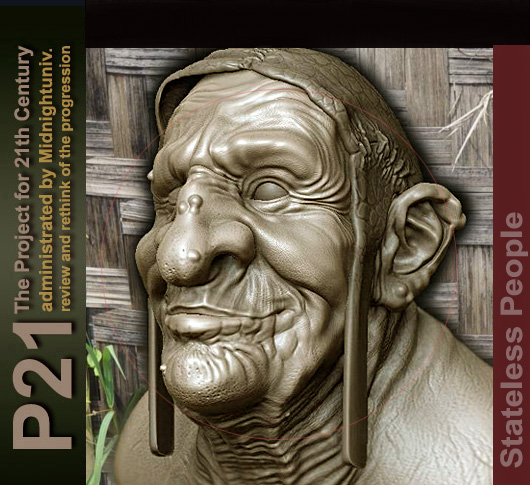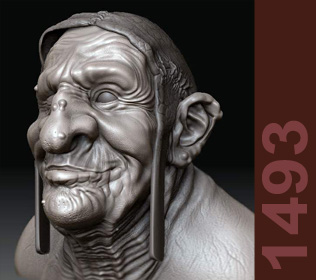



บรรณาธิการแถลง: บทความทุกชิ้นซึ่งได้รับการเผยแพร่บนเว็บไซต์แห่งนี้
มุ่งเพื่อประโยชน์สาธารณะ โดยเฉพาะอย่างยิ่ง เพื่อวัตถุประสงค์ในการขยายพรมแดนแห่งความรู้ให้กับสังคมไทยอย่างกว้างขวาง
นอกจากนี้ยังมุ่งทำหน้าที่เป็นยุ้งฉางเล็กๆ แห่งหนึ่งสำหรับเก็บสะสมความรู้ เพื่อให้ทุกคนสามารถหยิบฉวยไปใช้ได้ตามสะดวก
ในฐานะที่เป็นสมบัติร่วมของชุมชน สังคม และสมบัติที่ต่างช่วยกันสร้างสรรค์และดูแลรักษามาโดยตลอด.
สำหรับผู้สนใจร่วมนำเสนอบทความ หรือ แนะนำบทความที่น่าสนใจ(ในทุกๆสาขาวิชา) จากเว็บไซต์ต่างๆ
ทั่วโลก สามารถส่งบทความหรือแนะนำไปได้ที่ midnightuniv(at)gmail.com
(กองบรรณาธิการมหาวิทยาลัยเที่ยงคืน: ๒๘ มกราคม ๒๕๕๐)

Stateless Peoples
Midnight
University

Lives of the Stateless
Peoples and Unidentified nationalities
Stateless Peoples: คนไร้รัฐในบริบทสังคมไทย
Benedict
Anderson
A
Keynote address at the Southeast Asian Studies - 22 February 2008
บทความวิชาการต่อไปนี้เป็นส่วนหนึ่งของโครงการสื่อเพื่อบริบทสิทธิมนุษยชน
ของเว็บไซต์มหาวิทยาลัยเที่ยงคืน ซึ่งเป็นโครงการไม่เกี่ยวข้องกับผลกำไร
โดยมีวัตถุประสงค์เพื่อแสวงหาตัวอย่างและกรณีศึกษาเกี่ยวกับเรื่องสิทธิมนุษยชน
จากประเทศชายขอบทั่วโลก มาเป็นตัวแบบในการวิเคราะห์และสังเคราะห์
เพื่อเผชิญกับปัญหาสิทธิมนุษยชน(สิทธิชุมชน)ในประเทศไทย
บทแปลชิ้นนี้ได้รับมาจากคุณราณี
หัสสรังสี พร้อมต้นฉบับภาษาอังกฤษ ซึ่งเป็นการปาฐกถาเกี่ยวกับ
Lives of the Stateless Peoples and Unidentified nationalities"
ณ มหาวิทยาลัยธรรมศาสตร์ เมื่อวันที่ ๒๒ กุมภาพันธ์ ๒๕๕๑ ที่ผ่านมา
อาจารย์เบเนดิกท์ แอนเดอสัน เสนอว่า...ในทางทฤษฎี เราสามารถแยกประเภทของคนไร้รัฐ
เป็นประเภทต่างๆ ได้, ตัวอย่างของเมืองไทย เราจะเห็นว่ามีสามประเภทโดยทั่วไป
ประเภทแรก คือกลุ่มคนที่ในทางทฤษฎีแล้วมีประเทศชาติอยู่จริงๆ
แต่ประเทศเหล่านั้น
อยู่นอกเขตแดนไทย เช่น คนที่อาศัยอยู่ในบุรีรัมย์ สุรินทร์ และศรีสะเกษที่พูดภาษาตระกูลเขมร
และผูกพันกับรัฐชาติเขมรมากกว่า และคนพูดภาษาลาวในฝั่งตะวันตกของแม่น้ำโขง.
ประเภทที่สอง คือคนที่เชื่อว่าครั้งหนึ่งเขามีรัฐชาติเป็นของตัวเองแต่ถูกยึดไป
เช่น
คนในแถบชายแดนภาคใต้ คนเชียงใหม่ และคนมอญ. ประเภทที่สาม
คือชาวเขา
และชาวเลโดยส่วนใหญ่ เป็นพวกที่ไม่เคยมีชาติเป็นของตัวเองจริงๆ
(คลิกอ่านต้นฉบับภาษาอังกฤษ)
midnightuniv(at)gmail.com
บทความเพื่อประโยชน์ทางการศึกษา
ข้อความที่ปรากฏบนเว็บเพจนี้
ได้รักษาเนื้อความตามต้นฉบับเดิมมากที่สุด
เพื่อนำเสนอเนื้อหาตามที่ผู้เขียนต้องการสื่อ กองบรรณาธิการเพียงตรวจสอบตัวสะกด
และปรับปรุงบางส่วนเพื่อความเหมาะสมสำหรับการเผยแพร่ รวมทั้งได้เว้นวรรค
ย่อหน้าใหม่ และจัดทำหัวข้อเพิ่มเติมสำหรับการค้นคว้าทางวิชาการ
บทความมหาวิทยาลัยเที่ยงคืน
ลำดับที่ ๑๔๙๓
เผยแพร่บนเว็บไซต์นี้ครั้งแรกเมื่อวันที่
๒๗ กุมภาพันธ์ ๒๕๕๑
(บทความทั้งหมดยาวประมาณ
๑๓ หน้ากระดาษ A4)
+++++++++++++++++++++++++++++++++++++++++++++

Lives of the Stateless
Peoples and Unidentified nationalities
Stateless Peoples: คนไร้รัฐในบริบทสังคมไทย
Benedict
Anderson
A
Keynote address at the Southeast Asian Studies - 22 February 2008
seminar
on "Lives of the Stateless Peoples and Unidentified nationalities"
At Sriburapha Auditorium, Thammasat University, Bangkok.
Stateless Peoples
By Professor Benedict Anderson, Cornell University
(คลิกอ่านต้นฉบับภาษาอังกฤษ)
ประเทศไทย ถ้ามองในแง่ของภูมิศาสตร์ในระดับโลกแล้ว มีเนื้อที่เป็นอันดับ 49 ของ200 ประเทศในโลกที่ถือว่าเป็นรัฐอิสระ คือมีเนื้อที่ใหญ่กว่าสเปนแต่เล็กกว่าฝรั่งเศสเล็กน้อย ส่วนในด้านประชากร ประเทศไทยมีประชากรอยู่ในอันดับที่ 19 ซึ่งถือว่าอยู่ในอันดับต้นๆ ประเทศไทยยังมีชาติพันธุ์ที่แตกต่างกันทางภาษาและศาสนาเหมือนอีกหลายๆ ประเทศ ถ้ามองทั้งในแง่ภูมิศาสตร์และจำนวนประชากรแล้ว ประเทศไทยถือว่าเป็นรัฐอิสระขนาดกลางๆ ที่มีความสำคัญประเทศหนึ่ง
เพื่อที่จะศึกษาเรื่องของ "คนไร้รัฐ" ในบริบทกว้างๆ จากสถิติของ 200 ประเทศทั่วโลกที่กล่าวไปนั้น มีถึง 30% ที่มีประชากรต่ำกว่า 3 ล้านคน ซึ่งน้อยกว่าครึ่งหนึ่งของประชากรใน กรุงเทพมหานรกเสียอีก และยังมีอีก 34 ประเทศที่มีประชากรต่ำกว่า 1 ล้านคน เราจะมองว่าประเทศเล็กๆ เหล่านี้เป็นรัฐแบบใด ส่วนใหญ่ประเทศเหล่านี้เคยเป็นอาณานิคมของชาติยุโรป เช่น หมู่เกาะเล็กๆ ในทะเลคาริบเบียน ทะเลเมดิเตอร์เรเนียน และหมู่เกาะแปซิฟิก และมีฐานะยากจน ต้องพึ่งความช่วยเหลือจากต่างประเทศ หรือไม่ก็การท่องเที่ยว หรือไม่ก็เป็นสถานที่ฟอกเงินของเศรษฐีทั้งหลายที่ต้องการเลี่ยงภาษี ประเทศเล็กๆ เหล่านี้มีกี่ประเทศที่จัดว่าเป็น "ชาติ"จริงๆ นี่เป็นคำถามที่สำคัญ เพราะบางคนอาจจะคิดว่าประเทศเหล่านี้เป็น "ประเทศที่ไม่มีชาติ" ก็เป็นได้
การที่ข้าพเจ้ายกเรื่องนี้มาพูดเนื่องจากมีเหตุผล 3 ประการ
ประการแรก เพื่อจะย้ำเตือนท่านว่า "คนตัวเล็กๆ" ก็มีโอกาสจะได้มาซึ่งรัฐและสถานะของ "รัฐชาติ" และมีโอกาสจะมีที่นั่งในองค์กรสหประชาชาติ ไม่แปลกอะไรเลยที่คนไร้รัฐเหล่านี้จะต้องการมีรัฐเป็นของตัวเอง ถึงแม้ว่าความต้องการนั้นจะเสี่ยงและแลกมาด้วยเลือดเนื้อของคนจำนวนไม่น้อยก็ตาม
ประการที่สอง เพื่อย้ำถึงข้อเท็จจริงที่ว่ารัฐเล็กๆ เหล่านี้ส่วนใหญ่จะพึ่งพาความช่วยเหลือจากต่างชาติอยู่เป็นนิจ หรือไม่ก็การท่องเที่ยวจากต่างชาติ
ประการที่สาม คือส่วนใหญ่แล้วผู้ปกครองของรัฐเหล่านี้จะปฎิบัติกับประชาชนของตนไม่ค่อยดีนัก ข้าพเจ้าประมาณคร่าวๆ ว่ามีสองในสามเท่านั้นที่พุดได้ว่าเป็นประชาธิปไตยอย่างแท้จริง ดังนั้นเวลาเราพูดถึงคนไร้รัฐ เราควรจะมองในบริบทของประวัติศาสตร์โลก ไม่เอาความรู้สึกสงสารส่วนตัวเข้ามายุ่งเกี่ยว
คำถามต่อไปที่เราควรคิดคือ "คนไร้รัฐ" นั้นหมายความว่าอะไร ถ้ามองกันตามตรงแล้ว เราควรจะตระหนักว่าคนเหล่านี้ไม่น่าจะมีอยู่แล้วในปัจจุบัน แต่ถ้าเราดูในภูมิภาคเอเชียตะวันออกเฉียงใต้เป็นตัวอย่าง แม้ในปลายสงครามโลกครั้งที่สอง ก็ยังมีพื้นที่อีกบางพื้นที่ที่ยังถือว่าไม่ขึ้นกับรัฐใด เช่นทางตะวันตกของปาปัวซึ่งเป็นเขตเทือกเขาที่คนไม่ค่อยรู้จัก หรือทางตอนเหนือของพม่า แม้แต่ในบางส่วนของไทย ตอนเหนือของลาวและตะวันตกเฉียงเหนือของเวียดนาม เขตเหล่านี้ถึงจะปรากฏในแผนที่ว่าเป็นส่วนหนึ่งของประเทศ เช่น พม่า ลาว และเวียดนาม แต่รัฐแทบจะไม่เข้าไปยุ่งเกี่ยวกับชาวเขาที่อาศัยอยู่ในแถบนี้เลย อย่างไรก็ตามในช่วง 60 ปีที่ผ่านมาอำนาจการปกครองตัวเองของชาวเขาเหล่านี้ก็ลดลงไปมาก เนื่องจากการขยายการปกครองของรัฐ กระแสทุนนิยม และสงครามที่ยืดเยื้อยาวนาน
นอกจากนั้นเราควรจะถามตัวเองต่อว่า คนกลุ่มน้อยต่างๆ นี้ถูกรวมให้เป็น "ประชาชนของชาติ" ตั้งแต่เมื่อไหร่และอย่างไร
- แต่ก่อนนั้นชาวสเปนเคยเรียกกลุ่มคนมุสลิมในเกาะมินดาเนาและซูลูว่า "มอรอส" ซึ่งในภาษาสเปนแปลว่า"แขกมัวร์" หมายถึง ศัตรูชาวมุสลิมของชาวคาทอลิคในสเปน. คนในมินดาเนาและซูลูเพิ่งจะมาเรียกตัวเองว่าคนโมโรโดยไม่มีอคติใดๆ เมื่อช่วงปี 1970 นี่เอง
- ชาวดัชท์ที่เข้ามาปกครอง(อินโดนีเซีย) ก็เรียกชาวจีนที่อพยพมาจากจีนแผ่นดินใหญ่และลูกหลานของเขาอย่างรวมๆ ว่า "คนจีน" ทั้งๆ ที่คนจีนเหล่านี้เรียกตัวเองตามสำเนียงที่พูดเช่นฮกเกี้ยน แคะ กวางตุ้ง และไหหลำ พวกเขาเพิ่งคิดว่าตนเองเป็น "คนจีน"เมื่อทศวรรษ 1890 นี่เอง หรือ
- คนในติมอร์ตะวันออกซึ่งมีภาษาพูดมากกว่า 14 กลุ่มภาษาที่ไม่คล้ายกันเลย เพิ่งจะได้เป็นประชาชน ในปลายทศวรรษที่ 1960
ตัวอย่างเหล่านี้แสดงว่าตั้งแต่สมัยก่อนแล้วที่ประชาชนไม่ได้สร้างรัฐ แต่รัฐต่างหากที่สร้างประชาชน เช่นเดียวกับชาวเขาเผ่าต่างๆเช่นม้ง ลอซู เย้า กระเหรี่ยงที่เพิ่งตระหนักว่าตนเป็นประชาชนคนหนึ่งเมื่อไม่นานมานี้
ปรากฎการณ์นี้ เราอาจเรียกได้ว่าเป็นช่องว่างระหว่างความเป็นตัวตนที่มองจากความเป็นจริงโดยทั่วไป กับความเป็นตัวตนที่มองจากความรู้สึกของปัจเจก เราต้องย้ำเตือนตัวเองว่าอัตลักษณ์ของคนนั้นมักจะเกี่ยวพันกับประวัติศาสตร์ มีความสัมพันธ์ต่อเนื่องกัน แถมยังถูกจินตนาการขึ้นมา ไม่ใช่สิ่งที่จำเป็นหรือจีรังยั่งยืน เราต้องถามตัวเองว่ารัฐเริ่มคิดว่าคนกลุ่มๆ หนึ่ง เป็นหรือเรียกว่าประชาชนตั้งแต่เมื่อไหร่ เริ่มมีการจินตนาการว่าพวกเขาเป็นประชาชนตั้งแต่เมื่อไหร่? บางครั้งการจินตนาการนี้ก็ขึ้นอยู่กับว่าใครเป็นคนถาม และส่วนใหญ่คนถามที่สำคัญก็คือรัฐนั่นเอง เช่นเดียวกับที่เราเรียกกันว่า "คนไทย"
อย่างน้อยในทางทฤษฎี เราสามารถแยกประเภทของคนไร้รัฐเป็นประเภทต่างๆ ได้อย่างชัดเจน ในตัวอย่างของเมืองไทย เราจะเห็นว่ามีสามประเภทโดยทั่วไป
ประเภทแรก คือกลุ่มคนที่ในทางทฤษฎีแล้วมีประเทศชาติอยู่จริงๆ แต่ประเทศเหล่านั้นอยู่นอกเขตแดนไทย เช่น คนที่อาศัยอยู่ในบุรีรัมย์ สุรินทร์ และศรีสะเกษที่พูดภาษาตระกูลเขมร และผูกพันกับรัฐชาติเขมรมากกว่า และคนพูดภาษาลาวในฝั่งตะวันตกของแม่น้ำโขง
ประเภทที่สอง คือคนที่เชื่อว่าครั้งหนึ่งเขามีรัฐชาติเป็นของตัวเองแต่ถูกยึดไป เช่นคนในแถบชายแดนภาคใต้ คนเชียงใหม่ และคนมอญ
ประเภทที่สาม คือชาวเขา และชาวเลโดยส่วนใหญ่ เป็นพวกที่ไม่เคยมีชาติเป็นของตัวเองจริงๆ คนกลุ่มต่างๆ
ที่ว่ามานี้ถือเป็นคนไร้รัฐในความหมายที่แตกต่างกัน ซึ่งเวลาที่พูดถึงเรื่องนี้เราต้องตระหนักถึงความแตกต่างเหล่านี้ให้ดี
กลุ่มที่ 1 คือกรณีของภาคอีสาน ทั้งอีสานเหนือและอีสานใต้ เนื่องจากภูมิภาคนี้มีผู้มีสิทธิ์เลือกตั้งเป็นจำนวนมาก มีประชาธิปไตยที่ไม่ราบรื่น สถาบันการศึกษาและระบบทุนนิยมขยายตัวอย่างรวดเร็ว และการอพยพย้ายถิ่นฐานไปมาได้อย่างง่ายดาย เหล่านี้ทำให้ "ประชาชน"อีสานมีฐานกำลังที่แข็งแรง มีนักการเมืองที่มีอิทธิพลอย่าง เนวิน ชิดชอบ และเสนาะ เทียนทอง ที่หาเสียงเป็นภาษาเขมรแต่อภิปรายในรัฐสภาเป็นภาษาไทย การขยายตัวของการศึกษาทำให้หลายคนในภูมิภาคนี้ประสบความสำเร็จทางธุรกิจ จนเข้ามามีส่วนร่วมทางการเมืองและการทหารได้. เช่นเดียวกับกรณีของลูกจีนซึ่งเป็นคนชั้นกลางในกรุงเทพและต่างจังหวัด สิ่งที่คนในกลุ่มนี้ต้องการจากส่วนกลางที่สุดคือ การยอมรับทางวัฒนธรรม การไม่ดูถูก และเนื้อที่ที่มากขึ้นในการพัฒนาตนเองในเชิงชาติพันธุ์ พวกเขาจะมีอำนาจทางการเมืองหรือไม่นั้น แน่นอนเป็นอีกเรื่องหนึ่ง เหมือนเราได้เห็นมาแล้วใน 5 ปีที่ผ่านมา
กลุ่มที่ 2 คนสามกลุ่มที่ว่ามามีส่วนที่เหมือนกัน แต่ก็ยังมีความแตกต่างกัน ในบางกรณีถึงแม้ว่า "คนเมือง" จะรู้สึกว่าพวกเขาเป็นคนที่มีประวัติศาสตร์และวัฒนธรรมที่โดดเด่น การดูดซับเอาเชียงใหม่เข้ามาเป็นส่วนหนึ่งของกรุงเทพก็ไม่ได้เป็นเรื่องรุนแรงเสมอไป บางครั้งรัฐกลับยอมรับความโดดเด่นนี้ด้วยซ้ำไป เชียงใหม่เป็นเมืองที่อุดมสมบูรณ์ และยิ่งทักษิณ ชินวัตรขึ้นมามีอำนาจยิ่งทำให้คนเหนือรู้สึกใกล้กับความเป็นนายกรัฐมนตรีมากขึ้น อีกปัจจัยที่ทำให้คนเหนือไม่ได้เป็นปัญหาคือภาษาเหนือที่ไม่ได้แตกต่างจากภาษากลางสักเท่าใด คนมอญในประเทศไทยได้แต่งงานกับคนไทยในภาคกลางและคนไทยเชื้อสายจีนมาเป็นเวลานาน และพวกเขาก็ภูมิใจที่มีส่วนในการสร้างสรรค์เพลง "ชาติ" และศิลปะที่ทำจากพลาสติก แต่พวกเขาก็ตระหนักดีว่าพวกเขามีชีวิตที่ดีกว่าในเมืองไทยมากกว่าญาติโยมที่อยู่ในพม่า แต่เท่าที่ข้าพเจ้ารู้พวกเขาก็ไม่ได้หวนหาอดีตอันยิ่งใหญ่ของอาณาจักรมอญในสมัยก่อนอีกแล้ว อย่างไรก็ตามจำนวนของคนมอญยังน้อย ภาษามอญก็อ่อนแอเกินไป ไม่สามารถสร้างอำนาจต่อรองในระดับภูมิภาคเหมือนภาคอีสานและภาคเหนือได้
คนมุสลิมเชื้อสายมลายูในปัตตานีเก่า เป็นกรณีที่แตกต่างโดยสิ้นเชิงอย่างที่เรารู้กันอยู่ ในสมัยที่ประเทศไทยปกครองแบบสมบูรณายาสิทธิราชย์ คนในปัตตานีถูกโจมตีและถูกบังคับให้ขึ้นต่อส่วนกลางเป็นครั้งเป็นคราว แต่ส่วนกลางก็ไม่ได้มีอำนาจอะไรมากไปกว่าที่ให้หัวเมืองทางใต้ส่งบรรณาการมา หรืออพยพคนออกจากปัตตานีเพื่อทำให้ปัตตานีอ่อนแอลง. ตั้งแต่สมัยรัชการที่ 5 ปัตตานีถูกปกครองโดยคนที่ส่งมาจากกรุงเทพ ไม่เหมือนสตูลที่ให้ความร่วมมือกับกรุงเทพ เจ้าหน้าที่พวกนี้ดูถูกทุกอย่างที่เกี่ยวกับปัตตานีและคนที่นั่น เพราะพวกเขาเป็นมุสลิมซุนหนี่ ไม่ใช่มุสลิมชีอะห์ในภาคกลางของไทยซึ่งมีความสนิทสนมกับรัฐมาตั้งแต่โบราณ
พวกเขาเผชิญกับความโดดเดี่ยว ความยากจน และการกีดกันทางเชื้อชาติ เนื่องจากผิวสีคล้ำกว่าและผมที่หยิกกว่าคนภาคกลาง เจ้าหน้าที่ที่ส่งมาจากส่วนกลางก็เป็นมุสลิมชีอะห์ที่อยู่กรุงเทพมากกว่า หรือพูดไทย ไม่ต้องการเรียนภาษาใต้ ยิ่งไปกว่านั้นปัตตานียังเป็นสถานที่ที่เปรียบเสมือนกระโถนรองรับเจ้าหน้าที่ที่ถูกลงโทษแล้วถูกส่งมาปฎิบัติงานในภาคใต้ คนในกรุงเทพเองน้อยนักที่จะคิดว่าคนปัตตานีทำอะไรในการสร้างชาติสมัยใหม่เหมือนที่คนมอญหรือคนภาคเหนือทำ
คนแถบชายแดนภาคใต้ยกเว้นคนสตูลแล้ว ถือว่าเป็นปัญหาพิเศษสำหรับส่วนกลาง เพราะพวกเขาก็เคยเป็นรัฐมาก่อนในอดีต และยังมีประชากรหนาแน่น อยู่ไกลจากกรุงเทพและส่วนอื่นของประเทศ แถมอยู่ติดกับมาเลเซียซึ่งถูกปกครองโดยชาวมาเลย์ ในทางศาสนาแล้วพวกเขายังถือว่าตนเป็นส่วนหนึ่งของโลกมุสลิมซึ่งกินเนื้อที่ในหลายทวีป มีประเพณีอันเก่าแก่คือการไปแสวงบูญที่เมกกะ คนมีการศึกษาในปัตตานีเองก็ตระหนักดีว่าในองค์กรสหประชาชาติ ดังที่ข้าพเจ้าได้กล่าวมาแล้ว มีสมาชิกจำนวนมากที่เป็นประเทศที่มีประชากรและเนื้อที่น้อยกว่าปัตตานีเก่า
รัฐในกรุงเทพมีความเป็นชาตินิยมเกินไปที่จะยอมรับว่าชายแดนภาคใต้ไม่ใช่ส่วนหนึ่งของไทย หลังจากที่กรุงเทพได้ปัตตานีมาแล้ว สิ่งที่ทำได้คือคอยกดดันไม่ให้ปัตตานีเจริญขึ้นมา และคิดว่าถ้าเวลาผ่านไปจะแก้ปัญหาได้ แต่ความเป็นจริงในปัจจุบันก็รู้กันอยู่ว่าแก้ไม่ได้ สิ่งที่ต้องทำอย่างน้อยที่สุดคือ การให้อำนาจปกครองทางการเมืองอย่างแท้จริง แต่ก็คงเป็นไปไม่ได้ เพราะเท่ากับเป็นการจงใจแก้ไขความผิดพลาดของรัชการที่ 5 อันทรงเป็นที่รักของประชาชน. ในกรณีของมาเลเซียอาจเป็นตัวอย่างที่ดี คือให้เป็นสหพันธรัฐโดยมีสุลต่านเวียนกันปกครอง ทำให้คนยังรู้สึกว่าตนเป็นส่วนหนึ่งของรัฐชาติ. แต่รัชการที่ 5 ทรงทำในทางกลับกัน คือกำจัดราชวงศ์ที่นั่นให้หมด ยกเว้นราชวงศ์ของท่านเอง อย่างไรก็ตามก็คงยังเป็นไปไม่ได้ที่รัฐจะยกเลิกการใช้นโยบายที่ใช้กันอยู่ โดยส่วนตัวแล้วข้าพเจ้าคิดว่าชายแดนภาคใต้ไม่ได้เป็นปัญหา แต่กรุงเทพนั่นแหล่ะที่เป็นปัญหาใหญ่
กลุ่มที่ 3 คนในกลุ่มนี้อยู่ในฐานะที่แย่ที่สุด เนื่องจากการที่ประชากรในที่ราบลุ่มของไทยขยายตัว การคมนาคมดีขึ้น การสื่อสาร การสร้างบ้านที่พักและการประมงเพื่อการค้า ทำให้คนกลุ่มน้อยในภาคต่างๆ ไม่มีที่หนีไป จึงต้องอยู่อย่างกระจัดกระจาย และไม่มีโอกาสรวมตัวกันเพื่อตั้งสมาคมทางการเมือง พวกเขาไม่มีอำนาจต่อรองใดๆ และยังถูกเอารัดเอาเปรียบ เหมือนกับยุโรปในปัจจุบันที่กีดกันยิปซี เพราะคนพวกนี้เป็นคนอพยพเร่รอนมาแต่โบราณ และรัฐตั้งแต่อดีตถึงปัจจุบัน ก็ไม่ค่อยชอบคนย้ายถิ่นเพราะพวกเขาดูแลยาก เกณฑ์มาเป็นทหารยาก และเก็บภาษียาก
ถ้าคนในกลุ่มนี้ฝันถึงการมีรัฐเป็นของตัวเอง หรือเข้ามามีส่วนร่วมกับรัฐในส่วนกลางมากขึ้น คนในกลุ่มนี้ก็คงถือเป็นคนไร้รัฐ ซึ่งโดยส่วนใหญ่แล้วพวกเขาก็ยินดีที่จะเป็นคนไร้รัฐ พวกเขาไม่ค่อยได้รับความสนใจจากรัฐเท่าใดนัก มีเพียงผู้เผยแพร่ศาสนาทั้งพุทธและคริสต์ และนักมานุษยวิทยาเท่านั้น ที่จะสนใจภาษาหรือวัฒนธรรมของพวกเขา
ชนกลุ่มน้อยเหล่านี้ไม่ค่อยได้รับความเป็นธรรมจากรัฐ เพราะรัฐถือว่าพวกเขาไม่ค่อยมีส่วนช่วยในการสร้างความเป็นชาติเท่าใดนัก ชาวเขาหลายคนแม้แต่บัตรประชาชนบางครั้งยังได้มาอย่างยากเย็น ทั้งๆ ที่นักมานุษยวิทยาได้แสดงให้เห็นว่าคนในกลุ่มที่ 3 มีวัฒนธรรมที่ให้ความเท่าเทียมกันกับทุกคนมากกว่าส่วนอื่นของประเทศ
ในระยะยาว คนในกลุ่มนี้จะต้องกล้าที่จะเปลี่ยนแปลงไปสู่สถานภาพที่พวกเขามีรัฐ หรือถ้าจะพูดให้ดีกว่านั้นก็คือรัฐนั้นมีพวกเขา พวกเขาจะต้องมีแรงสนับสนุนทางการเมือง สังคมและวัฒนธรรม เพื่อที่จะมีสิทธิ์มีเสียงทางการเมือง และยังต้องหาคนลงเรือเดียวกันต่อสู้ร่วมกัน เราคงต้องมาขบคิดกันอย่างหนักว่า ส่วนกลางจะฟังพวกเขาหรือไม่ หรืออย่างน้อยมีทางออกอะไรที่เหมาะสมสำหรับพวกเขาหรือไม่
A Keynote address at the Southeast Asian Studies' seminar
on
"Lives of the Stateless Peoples and Unidentified
nationalities"
At Sriburapha Auditorium, Thammasat University, Bangkok.
22 February 2008
Stateless Peoples
By Professor Benedict Anderson
Cornell University
Let me begin my remarks today with a few words about the global place of Thailand along two simple axes. In terms of geographic spread, the country ranks as Number 49 out of the roughly 200 generally recognized independent states, i.e. at the bottom of the leading 25%. Slightly bigger than Spain, slightly smaller than France. A lot smaller than Texas, but a lot bigger than New Mexico. In terms of population it ranks much higher, i.e. Number 19, or within the leading 10%, just above France.
Like all the states above it, and also like most of the states below it, Thailand's population includes many ethnolinguistic and religious groups. You could also say that by combining the two axes, Thailand comes out as a reasonably important middle-range nation-state.
If the above information will not be a surprise to you, I would like to offer you another kind of picture, so that we can consider the question of 'peoples without states' in a broad context. Out of the roughly 200 states mentioned above, no less than 61, or about 30%, have populations less than 3 million, a figure substantially less than half of the population of Krung Thep Maha Narok. 34 states have less than a million people, and 15 have less than 100,000. What kind of entities are these microstates? Many are small islands in the Caribbean, the Atlantic, the Mediterranean, the Indian, and the Pacific oceans, and can be said to be products of European imperialism and colonialism. But there also plenty in Europe itself, mostly relics from the feudal era. With the exception of the European and Persian Gulf cases, these states are poor, vastly dependent on outside aid, and relying for survival on tourism, and, in some cases on banks which specialize in hiding the wealth of the world's richest people who are eager to avoid being taxed at home. How many of them are really 'nations' is also a serious question, so that one might also think of them as 'states without nations.'
I bring this material to your attention for three reasons. The first is to remind you that it is quite possible for ' very small peoples' to gain states and thus the status of 'nation-states' and have seats in the United Nations. So that the ambition of some stateless people to have their own states is not at all irrational, though it usually very risky and lead to much loss of life. The second is to underline the fact that most such microstates are doomed to perpetual dependence on foreign aid, foreign tourists, and foreign tax-evaders in order to survive. The third is that there is no reason to suppose that the rulers of such states will automatically behave well towards their own peoples. By my rough estimate, only about two thirds of them can be said to be reasonably democratic. So the question of peoples without states should be discussed without sentimentality, and in a global-historical context.
The next question that we should be thinking about is what we mean by 'peoples without states.' In some obvious ways, we should realize that they do not really exist any more today. If we look, for example, at our own region, Southeast Asia, as recently as the end of World War Two there were still substantial areas which were essentially stateless. We could include here the vast, largely unknown mountainous terrain of West Papua, held weakly by Dutch colonialism until 1962, and then transferred formally to Indonesia without any local peoples' consent. We could also include a huge mountainous belt comprising parts of northern Burma, even parts of Thailand, as well as northern Laos and Northwestern Vietnam. Occupied by nomad and sedentary 'hilltribes,' which were part of post-colonial Burma, Laos and Vietnam in atlases, in every day reality they were little touched by these states. Part of Thailand itself was essentially controlled not by Bangkok but residual Kuomintang warlords. But over the last sixty years the real autonomy of these hilltribes has drastically declined as a result of state expansion, the spread of capitalism, and in many cases long and bloody wars.
It is also worth asking ourselves when and how these and other comparable groups came to be thought of as 'peoples.' We know that for centuries Spanish colonialists referred to the various Muslim groups in Mindanao and Sulu as 'Moros,' the Spanish word for the Moors, originally meaning Catholic Spain's Muslim enemies along the north shore of the Mediterranean. But it was only in the 1970s that these peoples began to call themselves, without irony, the bangsa Moro, or Moro People. We know that while for centuries Dutch colonialists called all the immigrants from Southeast China, and their descendants, "Chinese," these people, mostly illiterate, speaking mutually unintelligible Hokkien, Hakka, Cantonese, and Hainanese, did not think of themslves as 'Chinese" till the 1890s. Up till more or the less the same time, the ruling class of Siam spoke of Hor (arriving by land) and Jek (arriving by sea) as if they were different peoples. The East Timorese, composed of at least 14 social groups speaking mutually unintelligible languages , only became a people in the late 1960s. A nice illustration of this problem comes to us from British India. When the authorities finally had the power to hold a census in remote Buddhist Ladakh, in the 1920s, they made the mistake of asking the local people "who they were," and received over 300 different replies, (including I am a trader, I am a monk, I belong to Clan X or Y, I am a Shia, I am a widow, and I moved here ten years ago.) Annoyed by this multitude, for the next census the British decided on 30 or so categories of their own, and forced the locals to belong to one or another of them. So there is plenty of evidence for the old idea that it is commonly not peoples who create states, but states that create peoples. This most likely is how in fairly recent times 'peoples' like the Hmong, Lisu, Yao, Karen and so forth have gradually learned to see themselves as peoples. People in Bangkok usually speak of the Far South, as the violent place of Malay-speaking Muslims. It is possible that in the end they call into being just such a 'people.' But not yet, because the locals in Satun are not violent, and still do not share a common imagined identity with those of Pattani, Yala, and Narathiwat.
This phenomenon - which we can all the gap between 'objective' and 'subjective' identity - is, in different forms, visible everywhere. If I ask someone in Bangkok where she is from, she will not say from Thailand, but rather 'Songkhla or Isan,' but if I meet her in Singapore she will say I am from Thailand; and if we in meet in Chicago, she might easily say I am from Asia, if she thinks I have never heard of Thailand.
The point of all this is to remind ourselves that the identities of peoples are historical, relational, and imagined, not essential and unchanging. One must always ask oneself, when did states start to imagine a group which it called, or better, named, a people. When did people start to take over this imagining? In ways does this imagining depend on who asks the question: Who are you? Always the most important questioner is the state. This applies just as much to 'the Thai people' as to any other.
One can, at least in theory, make practical distinctions between different kinds of peoples without states, even if this title is, as I suggested earlier, actually out of date. Meuang Thai offers some good examples of the three commonest types. One group consists of peoples who in theory have real national states, but these states lie outside Thailand's borders. The obvious examples are the Khmer-speakers north of the Dongrak chain, especially in Buriram, Surin, and Sisaket, who are perfectly aware of the Khmer nation-state south of the mountains; or the Lao-speaking people on the west bank of the Mae Khong, who can see Prathet Lao on the opposite side of the river. A second group consists of peoples who believe they once had a state of their own, but have long been deprived of it. In the far South, facing the Gulf of Siam, the memory of the Keradjaan of Old Pattani is quite strong, since it was abolished by R V only a century or so ago. Northerners have comparable memories of Old Chiangmai, even if they do not wish to remember too clearly two centuries of quiet life as part of the Burmese empire, and a notable if secondary role in the destruction of Ayuthaya. Perhaps one should think of the Jin in the same way. The Mon are a hybrid case, since the great Mon kingdom of the past lay in today's Southern Burma, where even today the majority of Mon actually live. The third group consists mainly of hilltribes and the Chao Le, who probably never had real states of their own. Each of these distinct groups is 'stateless' in a quite different sense, and to think about them one has to keep these differences clearly in mind.
Group 1. In the cases of Northern and Southern Isan, it does not seem to me that any very serious problems arise today (though Isan in the 1950s and 1960s was another matter). In all the regions, the institution of universal adult suffrage, unsteady democratization up to a point, the rapid spread of educational institutions up to the tertiary levels in almost all provinces, the successful spread of developmental capitalism, and the ease of internal migration, has created conditions in which these 'peoples' have a strong stake in the existing order, or useful lack of order one might say. Powerful veteran politicians like Newin Chidchob and Sanoh Thianthong campaign locally in Khmer but address the parliament in Bangkok Thai. The same could be said for powerful Lao-speaking politicians from the upper Northeast.. Enormous numbers of Lao-speakers have been migrating to Bangkok and all over the rest of the country. Educational expansion has given more opportunities for ambitious people from these regions to create successful businesses and enter the national bureaucracy and military. Isan also has the very large numbers to make an Isan bloc in parliament as serious matter. Beyond that, if they look across the borders at Laos and Cambodia, they see countries enormously poorer, with authoritarian regimes, and no obvious futures for Isaners themselves. Much the same is true of the lukjin who are pervasive in the middle class in Bangkok and upcountry, and feel they are doing very well. The rapid rise of China to world-power also gives them security for the long-term future. What all these groups may want is mostly something that Bangkok can easily give if it wishes, cultural acknowledgment, less contempt, more room for 'ethnic' selfcultivation and autonomy. Real political power, of course, is another matter, as we have seen over the past 5 years.
Group. 2 The
three cases have some things in common, but they are also quite distinct.
Although in some ways the "khon meuang" often feel that they are
a people with their own distinct history and culture, the absorption of Chiangmai
into the Bangkok state was not terribly violent, and, up to a point, this
distinctiveness is acknowledged by that state. The descendants of the old
jao are still there, even if they do not matter much. The region is prosperous
and Chiangmai is the country's second city. Access to national-level institutions
has been growing, and Thaksin's rise to power brought a Northerner to the
national Prime Ministership for the first time. One does not get the impression
that there is a real problem for another reason, which is that the language
of the North is not very distant from Central Thai, and has obvious affinities
with the vernacular of Isan. One might even say that the base of the Thaksin
regime's electoral power has been exactly a coalition of the North and the
Northeast. Thailand's Mon have long intermarried with Central Thai and Chinese,
and they are quite aware of their contributions to 'national' music and the
plastic arts. But they are also aware that they have life a good deal better
in Thailand than than their cousins in Burma (rather like the Khmers in Surin),
and, so far as I can tell, do not spend much time thinking about the grand
medieval Kingdom in the Irrawaddy delta. Yet their numbers are too few, and
their grip on the Mon language is today too weak, to create a serious regional
block, like the North and Isan.
The Muslims Malays of Old Pattani are, as we are well aware, a completely
different story. In the days of the old Thai imperial monarchy, they were
periodically suppressed by force of arms, and compelled to accept the distant
Thai rulers as suzerains. But the lower Chao Phraya flatland state itself
was too primitive and ramshackle to do much more than exact tribute and carry
away populations, so that Old Pattani was largely left alone till the times
of Rama V, and his competitive horse-trading with the expanding British Empire.
Unlike Satun, which for its own reasons cooperated with Bangkok, Old Pattani
came to be ruled by officials from Bangkok, who despised everything about
the place and the people. They were Sunni Muslims, unlike the mainly Shia
Muslims of Central Thai, long accommodated by the state. With distinctively
darker skins, curlier hair, etc it became easy -- as Western racial theories
spread East -- to think of these darker people in racist terms. Very stubbornly,
they insisted on speaking Malay, which had no filiation with the Thai languages
and which the rulers almost never bothered to learn. They had also almost
no state recognition, since the nominal head of the national Muslim community,
appointed by the Thai monarch, was usually a Shia or residing in Bangkok and
Thai-speaking. They experienced isolation, poverty, and often persecution.
Furthermore, modern Bangkok has always had the bad habit of not dismissing
from service cruel, incompetent, corrupt and stupid state officials, preferring
to merely transfer them to remote and poor regions of which the Far South
was the best example. You could say that administratively speaking, the Far
South was like the toilet bowl of the state machinery.
Furthermore, few Bangkok
people think that hese conquered people have had anything to contribute to
the modern nation, unlike the peoples of the North, the Northeast and the
Mon.
Some years ago I described the real attitude of the Suharto dictatorship towards
the resource rich provinces of Acheh and West Papua as: we don't want the
people, we just want the land and the resources. If they disappeared tomorrow,
we wouldn't miss them for one minute. There is something here that echoes
with what I have said above. The special difficulty for Bangkok is however
that the Far Southerners (except in Satun) not only carry a historical state-identity
with them, but have substantial population bases, in a concentrated area,
as far away from Bangkok as any part of the realm, and just next door to the
Malay-controlled state of Malaysia, with a pretty porous border. They are
also more and more aware of being part of a vast Muslim world across several
continents, an awareness embedded in the ancient tradition of the hajj to
Mecca. The educated sector is also aware of what I mentioned at the start
of this talk, which is that the UN has plenty of members which are smaller
in geographical size and lower in population than what is left of Old Pattani.
The Bangkok state's own national myths make it impossible to recognize openly that the Far South does not really belong to Thailand in any strong way, or that it 'owns' the region out of simple conquest and a deal with London. Yet it is useful to remember that during World War II, it grabbed, with Japanese help, substantial parts of western Cambodia, northwestern Burma, and still more of the southern peninsula. But in 1945 the Allies forced Bangkok to give these new possessions up, and noe one cares today that they were lost. At the same time, Bangkok has no idea what to do with the Old Pattani, except to offer some minimal carrots and a lot more sticks. Bangkok has always thought that time is on its side, but the reality today suggests the opposite. The necessary minimum change would be real political and symbolic autonomy, but this would mean consciously and deliberately rectifying the mistakes of the much revered Rama V (who, when he visited the Muslim South never visited a single mosque). Yet the example of Malaysia itself is suggestive. It is still in many ways a stable federal state, in that all the old or not so old monarchies are still in place, and Malaysian Muslims, especially in rural areas, are attached to them. The state has ingeniously found a way to combine these loyalties with the nation-state by rotating the office of head of state among these small rajahs. Conversely, Rama V's policy was to get rid of all local monarchies but his own, and it is still unthinkable today that this policy could be abandoned. My personal view on this matter that basically there is no Far South problem, but there is a huge Bangkok problem.
Group 3.
The peoples in this group are in the worst position of all. Ineluctable population
pressure from the flatland Thai, modern communications especially transportation,
massive logging (and in the case of the Chao Le) high-tech commercial overfishing,
military and police power available to Bangkok greater than ever before in
history, mean that the old option of strategic retreat into more remote and
difficult terrain has really vanished for good. These people are small in
numbers, scattered in their habitats, and unsophisticated in modern means
of social and political organization, hence they have few of what James Scott
famously called 'the weapons of the weak.' Only a handful of them have reasonably
good secondary, let alone tertiary education, and this elite can usually be
coopted. Many of them face a special disadvantage which we can better understand
by reminding ourselves that the most oppressed people in modern Europe, up
until today, have been the Gypsies. The basic reason is that the age-old tradition
of the Gypsies is nomadism, constant movement across state boundaries. All
modern, and also mediveal states, have hated moving populations, because they
are hard to monitor, to empress into armies, and to force to pay taxes.
If the people I have been talking about earlier would like better access to
the Bangkok state, or dream about reviving their own old states, the people
in group 3 for the most part have always been stateless peoples, and, most
of the time, have been happy with their statelessness. But is just this statelessness
that nationalist, Buddhist, monarchical Bangkok finds it impossible to imagine.Furthermore,
no one but a scattering of Christian and Buddhist missionaries and anthropologists
has any interest in Group 3's languages or cultures.
How lowly they are regarded, and how little they are thought capable of contributing to the national identity is shown by characteristic state policies: a curious mix of charity, contempt, ignorance, indifference, and brutality. It is worth thinking about the historical fact that the only people within Thailand's borders to have suffered napalm assaults from Bangkok have been the Hmong. It is thus probably typical that some of these Group 3 people find it difficult even to get the papers which would confirm that they are fellow-citizens of the rest of the country's population. (In this context it should be noted that, partly because of Thailand's strong monarchical traditions, the concept of citizenship is pretty weakly developed.) This is, for the peoples in Group 3, a pity, since anthopologists have shown us that they are much more egalitarian in their customs than the rest of the country.
In the longer run, in order to survive, they will have to make some bold adapations to the situation that they have a state, or perhaps better, a state has them. These adaptations will also have to be primarily political , though with social and cultural support. In effect they will have to make political noise, and also ally themselves with other people who are in the same boat. Whether Bangkok will listen to them, or have any creative ideas about how humanly to accomodate them is something for us all to think about very seriously. Thank you!
++++++++++++++++++++++++++++++++++++++++++
นักศึกษา
สมาชิก และผู้สนใจบทความมหาวิทยาลัยเที่ยงคืน
ก่อนหน้านี้ หรือถัดจากนี้สามารถคลิกไปอ่านได้โดยคลิกที่แบนเนอร์
ไปหน้าแรกของมหาวิทยาลัยเที่ยงคืน
I สมัครสมาชิก I สารบัญเนื้อหา 1I สารบัญเนื้อหา 2 I
สารบัญเนื้อหา 3 I สารบัญเนื้อหา
4
I สารบัญเนื้อหา
5 I สารบัญเนื้อหา
6
ประวัติ
ม.เที่ยงคืน
สารานุกรมลัทธิหลังสมัยใหม่และความรู้เกี่ยวเนื่อง
e-mail :
midnightuniv(at)gmail.com
หากประสบปัญหาการส่ง
e-mail ถึงมหาวิทยาลัยเที่ยงคืนจากเดิม
[email protected]
ให้ส่งไปที่ใหม่คือ
midnight2545(at)yahoo.com
มหาวิทยาลัยเที่ยงคืนจะได้รับจดหมายเหมือนเดิม
มหาวิทยาลัยเที่ยงคืนกำลังจัดทำบทความที่เผยแพร่บนเว็บไซต์ทั้งหมด
กว่า 1300 เรื่อง หนากว่า 25000 หน้า
ในรูปของ CD-ROM เพื่อบริการให้กับสมาชิกและผู้สนใจทุกท่านในราคา 150 บาท(รวมค่าส่ง)
(เริ่มปรับราคาตั้งแต่วันที่ 1 กันยายน 2548)
เพื่อสะดวกสำหรับสมาชิกในการค้นคว้า
สนใจสั่งซื้อได้ที่ midnightuniv(at)gmail.com หรือ
midnight2545(at)yahoo.com
สมเกียรติ
ตั้งนโม และคณาจารย์มหาวิทยาลัยเที่ยงคืน
(บรรณาธิการเว็บไซค์ มหาวิทยาลัยเที่ยงคืน)
หากสมาชิก ผู้สนใจ และองค์กรใด ประสงค์จะสนับสนุนการเผยแพร่ความรู้เพื่อเป็นวิทยาทานแก่ชุมชน
และสังคมไทยสามารถให้การสนับสนุนได้ที่บัญชีเงินฝากออมทรัพย์ ในนาม สมเกียรติ
ตั้งนโม
หมายเลขบัญชี xxx-x-xxxxx-x ธนาคารกรุงไทยฯ สำนักงานถนนสุเทพ อ.เมือง จ.เชียงใหม่
หรือติดต่อมาที่ midnightuniv(at)yahoo.com หรือ midnight2545(at)yahoo.com
1
2
3
4
5
6
7
8
9
10
11
12
13
14
15
16
17
18
19
20
21
22
23
24
25
26
27
28
29
30
31
32
33
34
35
36
37
38
39
40
41
42
43
44
45
46
47
48
49
50
51
52
53
54
55
56
57
58
59
60
61
62
63
64
65
66
67
68
69
70
71
72
73
74
75
76
77
78
79
80
81
82
83
84
85
86
87
88
89
90





























